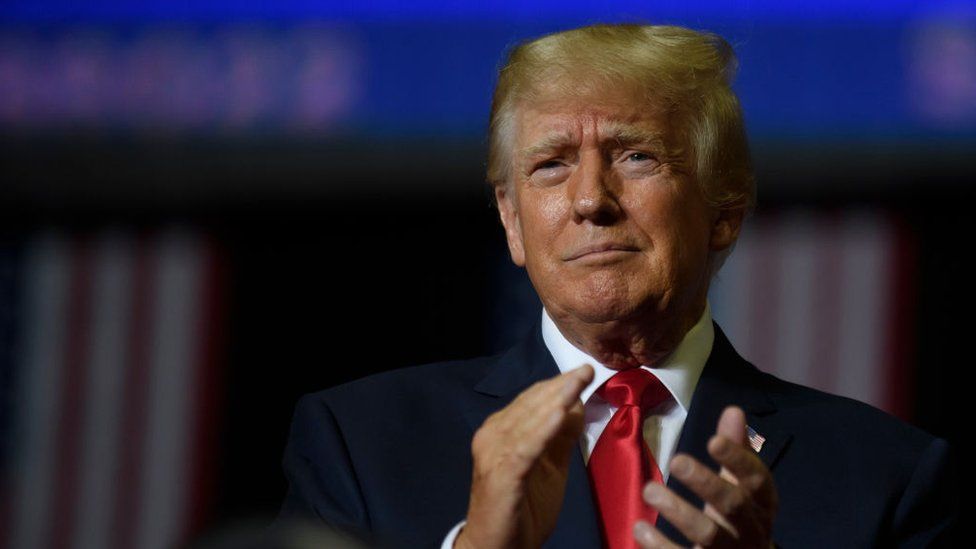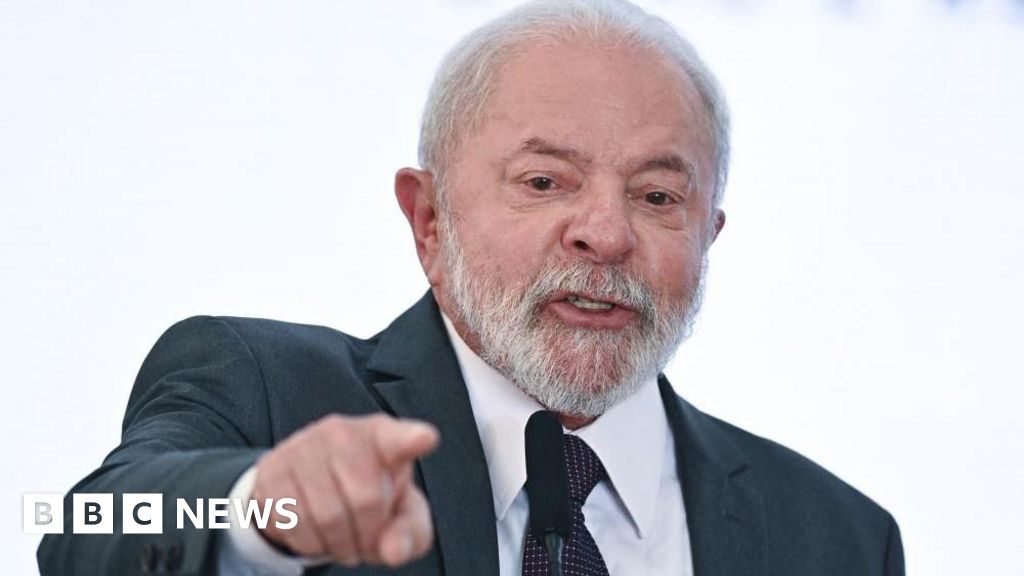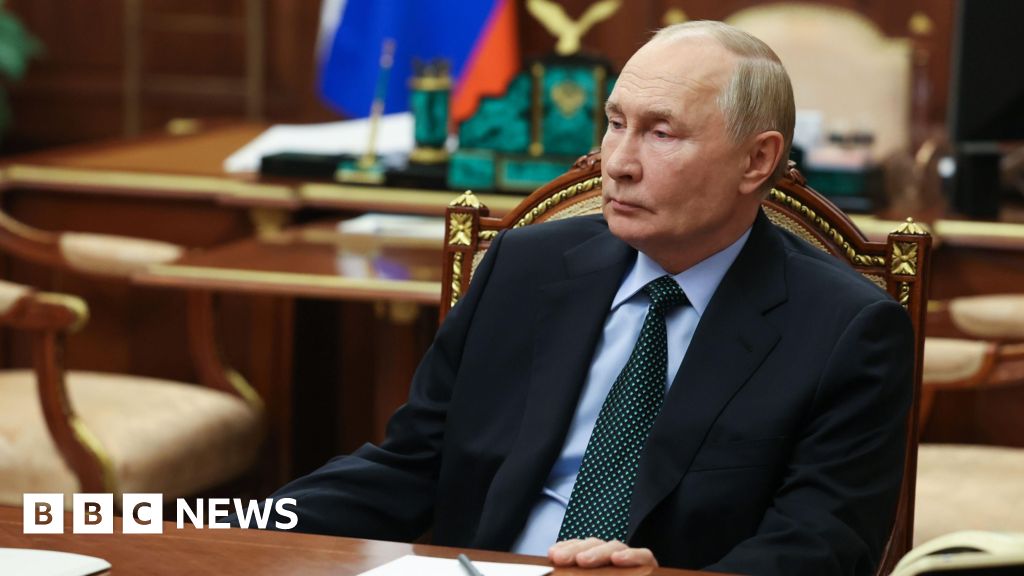ARTICLE AD BOX
By Bernd Debusmann Jr
BBC News, Washington
 Image source, Getty Images
Image source, Getty Images
As Donald Trump's legal woes mount, donors and the Republican party have paid millions in dollars of his legal fees.
His newest legal headache saw him and three of his children hit with a fraud lawsuit, which alleges they lied about the value of property "by billions".
Financial data shows that he has already spent more than $1m (£890,000) of donations fighting the case in 2022.
Mr Trump has denied any wrongdoing.
The latest lawsuit, announced by New York state Attorney General Letitia James, was the culmination of a long-running civil investigation which began in 2019.
Funded by supporters' donations
Millions of dollars spent combatting these charges have come from Mr Trump's Save America political action committee (PAC) - which takes donations from Trump supporters across the country - Federal Election Commission (FEC) filings show.
Save America has paid more than $1.12m this year alone to law firms hired to defend Mr Trump in the New York case. As a so-called "Leadership PAC", it can use money to pay for expenses that cannot be funded by campaign committees, such as some personal travel or some leadership expenses.
The website of Save America's Joint Fundraising Committee - which contributes both to Save America and a second Trump PAC, Make America Great Again - makes no mention of legal bills, saying only that "the future of our Country [sic] is at stake and President Trump is calling on all Patriots to join his fight to Save America".
Of the $1.12m spent, more than $942,000 has gone to the firm of Alina Habba, a New Jersey-based attorney who has doubled as a Trump spokeswoman.
Another lawyer, New York-based Alan Futerfas, received nearly $185,000 in July. Mr Futerfas is representing Mr Trump's children - Don Jr, Ivanka, and Eric - in the New York fraud case.
It is unclear how much of his own money Mr Trump has spent on his legal cases.
One donor told the BBC the idea of funding the lawsuits didn't bother him at all.
"In my opinion, he can do whatever he wants with the money," said Rom Solene, a Republican from Arizona.
"The non-stop nonsense and antics being conducted by the Democrats on a man who no longer holds political office shows the extent to which the Democrats are willing to go to persecute a political opponent. Not to mention, it shows how much the Democrats and other Washington insiders fear Mr Trump."
The fraud investigation is just one of several expensive legal challenges facing the former president, however.
The other cases include:
- A criminal investigation into possible property crimes, which is linked to the civil fraud case in New York. The state attorney general referred evidence to federal prosecutors and the Internal Revenue Service. The Manhattan District Attorney's office is also investigating.
- Allegations Mr Trump mishandled classified documents, which saw FBI agents search his Mar-a-Lago property on 8 August. He is also being investigated for obstruction of justice.
- The chief prosecutor of Georgia's Fulton County is investigating potential state election crimes related to efforts to overturn the 2020 election. Part of this revolves around a phone call, in which the former president told a top state election official to "find 11,780 votes".
- A congressional committee has accused Mr Trump of inciting "an insurrection" when his supporters ransacked the Capitol on 6 January 2021. There have been no charges arising from this investigation, which is ongoing.
- Various lawsuits by police officers who have accused Mr Trump of inciting the 6 January attack in which they suffered injuries.
In August alone, Mr Trump spent more than $3.8m on legal fees in the wake of the FBI's search of his Palm Beach estate, Mar-a-Lago, the bulk of which - about $3m - went to a nearby Florida firm.
Smaller amounts went to lawyers involved in his other legal issues, including a Georgia investigation into whether he and his allies tried to illegally overturn the results of the 2020 presidential election.
But there is no indication the former president's method of settling his legal bills violates any statute.
Erin Chlopak, a campaign finance expert at the Campaign Legal Center, a Washington DC-based non-profit, told the BBC that legal expenses often fall into a "grey area", where it is left up to the Electoral Commission to decide if the expense is "personal" or whether it would exist "irrespective of a person's status as a candidate or officeholder, in which case the money can be used".
"That's a real problem in campaign finance law," Ms Chlopak said. "We've seen that not just in the context of legal expenses, but in even more blatant personal uses, like personal travel, dining out at expensive restaurants and staying in hotels."
In Mr Trump's case, Ms Chlopak added, the subject is complicated by the array of legal issues he is currently facing.
New York attorney general Letitia James wants the Trumps to repay $250m that she says was illegally obtained
"The results of applying the same standard would likely be different in circumstances related to business dealing that has nothing to do with one's status as a former president, as opposed to actions that someone took based on their status as an officeholder."
In the past, the Republican National Committee (RNC) has also helped pay for some of Mr Trump's legal bills, including some related to the New York attorney general's investigation.
In late August, however, Politico reported that the RNC would not pay legal fees related to the Mar-a-Lago search - and that it would completely stop paying legal fees if Mr Trump were to formally announce his intention to run for president in 2024.
Ms Chlopak noted that the RNC is free to use funds as it sees fit.
While he has hinted at the prospect, Mr Trump is yet to announce that he'll run for the White House again in 2024.

 2 years ago
17
2 years ago
17








 English (US)
English (US)